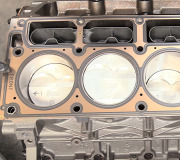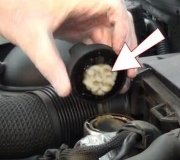1970 Chevy Nova V8 Automatic
The facts
1970 Nova
TH350 w/shift kit
95 chevy 350 2 bolt main short block
Isky 270 cam
Pete Jackson gear drive
Manley valves and guides
World S/R Torker heads
Edelbrock Performer Intake
Holley 850
MSD 6
MSD Streetfire distributor
I built this motor a few months ago. Had 2 row aluminum radiator and electric fan. The one piece oil pan gasket was leaking, so I lifted the motor and pulled the steering linkage, pulled the pan and replaced the seal with another felpro one piece seal. I finished after dark, and headed home. About 20 minutes into the trip, there was a loud boom, lots of smoke, and the car shut off. About 15 minutes later, it started and I headed to the nearest gas station. I found the distributor had been knocked loose and one of the plug wires had popped off the cap. It had shorted a wire. I replaced the wire and put everything back where it belonged. Since then, when I put the motor under a load, such as going 55+ on the road, it overheats quickly, usually running up to 250 degrees. I have replaced the radiator and fan, going to a 16 inch electric fan and 3 core aluminum radiator. No change. Went to a 165 degree thermostat. No change. Had it tested and the overflow tank had CO2 while running which suggested a blown head gasket. I changed the head gaskets today and still no change.
Any ideas?
SPONSORED LINKS
Saturday, January 2nd, 2010 AT 9:56 PM




